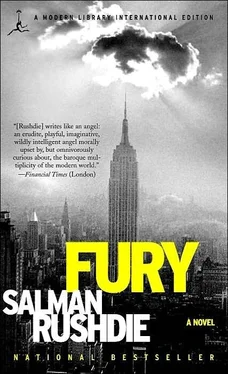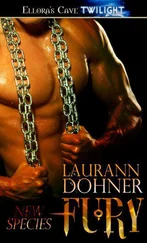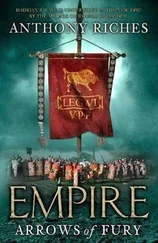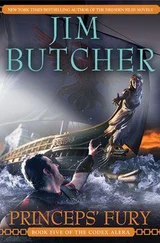Salman Rushdie - Fury
Здесь есть возможность читать онлайн «Salman Rushdie - Fury» весь текст электронной книги совершенно бесплатно (целиком полную версию без сокращений). В некоторых случаях можно слушать аудио, скачать через торрент в формате fb2 и присутствует краткое содержание. Город: New York, Год выпуска: 2002, ISBN: 2002, Издательство: Random House Publishing Group, Жанр: Современная проза, на английском языке. Описание произведения, (предисловие) а так же отзывы посетителей доступны на портале библиотеки ЛибКат.
- Название:Fury
- Автор:
- Издательство:Random House Publishing Group
- Жанр:
- Год:2002
- Город:New York
- ISBN:0679783504
- Рейтинг книги:5 / 5. Голосов: 1
-
Избранное:Добавить в избранное
- Отзывы:
-
Ваша оценка:
- 100
- 1
- 2
- 3
- 4
- 5
Fury: краткое содержание, описание и аннотация
Предлагаем к чтению аннотацию, описание, краткое содержание или предисловие (зависит от того, что написал сам автор книги «Fury»). Если вы не нашли необходимую информацию о книге — напишите в комментариях, мы постараемся отыскать её.
Fury — читать онлайн бесплатно полную книгу (весь текст) целиком
Ниже представлен текст книги, разбитый по страницам. Система сохранения места последней прочитанной страницы, позволяет с удобством читать онлайн бесплатно книгу «Fury», без необходимости каждый раз заново искать на чём Вы остановились. Поставьте закладку, и сможете в любой момент перейти на страницу, на которой закончили чтение.
Интервал:
Закладка:
Solanka restrained his mirth, charitably telling himself that in the conflict between that smile and those eyebrows, between silver-spoon England and tin-cup Poland, between this glowing six-foot Cruella De Vil fashion plate of a mother and that squat, flat-faced tank of a father, there might indeed be room for a writer to germinate and flourish. Who could say? These might even be the right breeding conditions for that unlikely hybrid, an English Kafka.
“Or, alternatively,” Dubdub pondered, “one could go in for the more commercial stuff. Valley of the Dollybirds. Or there’s the happy medium, halfway between the highbrow and the dross. Most people are middle brow, Solly, don’t argue. They want a little stimulation but not too blasted much. Also, by the by, not too blasted long. None of your great doorstops, your Tolstoy, your Proust. Short books that don’t give you a headache. The great classics retold—briefly—as pulp fiction. Othello updated as The Moor Murders. What do you say to that?”
That did it. Lubricated by the Waterford-Wajdas’ vintage champagne—neither of his own parents had seen fit to travel from Bombay to attend his graduation, and Dubdub had generously insisted on pouring him a glass, and refilling it frequently—Solanka erupted into an impassioned protest against Krysztof’s absurd proposals, pleading earnestly that the world be spared the literary outpourings of Waterford-Wajda, author. “Please, no obscurely menacing country-house sagas: Brideshead in the style of The Castle. Metamorphosis at Blandings. Oh, have mercy. Even more, regarding sex romps, restrain yourself. You’re more Alex Portnoy than Jackie Susann, who said, remember, that she admired Mr. Roth’s talent but wouldn’t want to shake his hand. Above all, from your blockbuster classics, desist. The Cordelia Conundrum? The Elsinore Uncertainty? Oh,oh, oh.”
After several minutes of such friendly-unfriendly teasing, Dubdub good-naturedly relented: “Well, p’raps I’ll be a film director instead. We’re just off to the South of France. They probably need film directors down there.”
Malik Solanka had always had a soft spot for goofy Dubdub, in part because of his ability to say things like this, but also because of the fundamentally good and open heart concealed beneath all the posh heehaw. Also, he owed him. At the Market Hill hostel of King’s College on a cold fall night in 1963, the eighteen-year-old Solanka had needed rescuing. He had spent his whole first day at college in a state of wild, overweening funk, unable to get out of bed, seeing demons. The future was like an open mouth waiting to devour him as Kronos had devoured his children, and the past—Solanka’s links with his family were badly eroded—the past was a broken pot. Only this intolerable present remained, in which he found he couldn’t function at all. Far easier to stay in bed and pull up the covers. In his characterless modern room of Norwegian wood and steel-frame windows he barricaded himself against whatever was next in store. There were voices at the door; he didn’t answer. Footsteps came and went. At seven P.m., however, a voice unlike any other-louder, plummier, and utterly confident of a reply-shouted out, “Anyone in there mislaid a bloody great trunk with some funny wog name on it?” And Solanka, to his own surprise, spoke up. So the day of terror, of suspended animation, ended and his university years began. Dubdub’s appalling voice, like a prince’s kiss, had broken the evil spell.
Solanka’s worldly goods had been delivered by mistake to the college’s hostel on Peas Hill. Krys—he hadn’t yet become Dubdub—found a cart, helped Solanka haul the trunk onto it and steer it to its proper home, then dragged the trunk’s hapless owner off for a beer and dinner in the college hall. Later they sat side by side in that hall listening to the dazzlingly shiny Provost of King’s tell them they were at Cambridge for “three things—Intellect! Intellect! Intellect!” And that in the years ahead they would learn most, more than in any supervision or lecture hall, from the time they spent “in one another’s rooms, fertilizing one another.” Waterford-Wajda’s unignorable bray—“HA, ha, ha, HA’ shattered the stunned silence that followed this remark. Solanka loved him for that irreverent guffaw.
Dubdub did not become a novelist or a film director. He did his research, got his doctorate, was eventually offered a fellowship, and snapped it up with the grateful look of a man who has just settled for ever the whole question of the rest of his life. In that expression Solanka glimpsed the Dubdub behind the golden-boy mask, the young man desperate to escape from the privileged world into which he had been born. Solanka tried inventing for him, by way of explanation, a hollow socialite of a mother and a boorish brute of a father, but his imagination failed him; the parents he had actually met were perfectly pleasant and seemed to love their son a great deal. Yet Waterford-Wajda had certainly been desperate, and even spoke, when drunk, of the King’s fellowship as a “blasted lifeline, the only thing I’ve got.” This, when by anyone’s ordinary standards he had so much. The fast car, the drum kit, the family spread in Roehampton, the trust fund, the Tatlerish connections. Solanka, in a failure of sympathy he later much regretted, told Dubdub not to roll about so much in the mud of self-pity. Dubdub stiffened, nodded, gave a hard laugh—“HA-ha-ha-HA”—and did not speak of personal matters again for many years.
The question of Dubdub’s intellectual capacity remained, for many of his colleagues, unanswerable: the Dubdub Conundrum. He seemed so foolish so often—a nickname that never caught on, because it was too unkind even for Cambridge men, was Pooh, after the immortal Bear of Little Brain—yet his academic performance won him much preferment. The thesis on Voltaire that got him his doctorate and provided the launchpad for his later fame read like a defense of Panglossboth of that imaginary worthy’s initial Leibnizian over-optimism and of his later espousal of fenced-in quietism. This ran so profoundly counter to the dystopic, collectivist, politically engage current of the times in which he wrote it as to be, for Solanka as for others, quite seriously shocking. Dubdub gave an annual series of lectures called “ Cultiver Son Jardin. ”Few lectures at Cambridge—Pevsner’s, Leavis’s, no others had attracted comparable crowds. The young (or, to be exact, the younger, because Dubdub for all his fogeyish attire had by no means done with his youth) came to heckle and boo but left more quietly and thoughtfully, seduced by his deep sweetness of nature, by that same blue-eyed innocence and concomitant certainty of being heard that had roused Malik Solanka from his first-day funk.
Times change. One morning in the mid-seventies, Solanka slipped in at the back of his friend’s lecture hall. What impressed him now was the toughness of what Dubdub was saying and the way in which his strongly contrasting, almost Pythonesque twittishness defused it. If you looked at him you saw a tweedy fop, hopelessly out of touch with what was then still being called the zeitgeist. But if you listened, you heard something very different: an enveloping Beckettian bleakness. “Expect nothing, don’t you know,” Dubdub told them, leftist radicals and beaded hairies alike, waving a crumbling copy of Candide. “That’s what the good book says. There will be no improvement in the way life is. Dreadful news, I know, but there you have it. This is as good as it gets. The perfectibility of man is just, as you might say, God’s bad joke.”
Ten years earlier, when various utopias, marxist, hippyish, seemed just around the corner, when economic prosperity and full employment allowed the intelligent young to indulge their brilliant, idiotic fantasies of dropout or revolutionary Erewhons, he might have been lynched, or at least heckled into silence. But this was the England in the aftermath of the miners’ strike and the three-day week, a cracked England in the image of Lucky’s great soliloquy in Godot, in which man in brief was seen to shrink and dwindle, and that golden moment of optimism, when the best of all possible worlds seemed just around the bend, was fading fast. Dubdub’s Stoical take on Pangloss—rejoice in the world, warts and all, because it’s all you’ve got, and rejoicing and despair are therefore interchangeable terms—was rapidly coming into its own.
Читать дальшеИнтервал:
Закладка:
Похожие книги на «Fury»
Представляем Вашему вниманию похожие книги на «Fury» списком для выбора. Мы отобрали схожую по названию и смыслу литературу в надежде предоставить читателям больше вариантов отыскать новые, интересные, ещё непрочитанные произведения.
Обсуждение, отзывы о книге «Fury» и просто собственные мнения читателей. Оставьте ваши комментарии, напишите, что Вы думаете о произведении, его смысле или главных героях. Укажите что конкретно понравилось, а что нет, и почему Вы так считаете.











